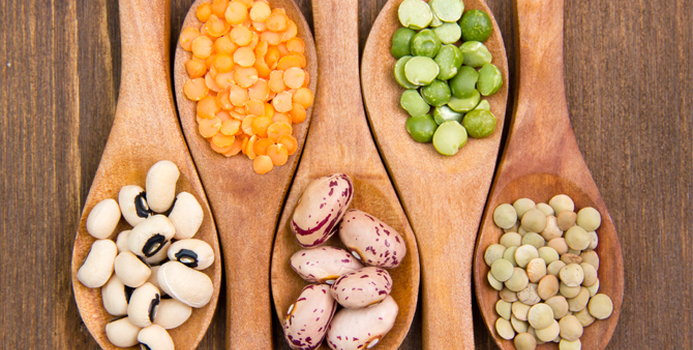Pinto beans are related to kidney beans. The beans are beige in color with brown spots or streaks. Once cooked, they loose their mottled appearance and become pinkish. The beans are an excellent source of dietary fiber and protein. They contain good amounts of vitamins B1 and B9 (folate). They are also a good source of magnesium, manganese, phosphorous, potassium, copper and iron. Some of the nutritional benefits of these beans are given below.
Dietary Fiber
The high fiber content helps to lower blood cholesterol. One cup of cooked beans provides about 60 percent of the recommended daily value of fiber. It also helps to control diabetes. Foods rich in fiber prevent rapid rises of blood sugar levels after a meal. The mottled beans help to stabilize blood sugar even as they provide a steady flow of energy. This makes them ideal for diabetics. Insoluble fiber increases stool bulk which helps to eliminate constipation. Digestive disorders such as irritable bowel syndrome can also be prevented by regular intake of insoluble fiber. Research has established that pinto beans and other high fiber foods can help lower the risk of heart attack.
Protein
The rich protein content in the beans makes them a good alternative to red meat. A one cup serving provides about 30 percent of the recommended daily value of protein. The protein from meat and dairy products often contains more calories due to the presence of saturated fat. Pinto beans are a healthier alternative if you prefer not to consume animal products.
Vitamin B1
This plays a vital role in cognitive functions. Foods rich in vitamin B1 can help you maintain your memory. One cup of the beans provides about 20 percent of the recommended daily value for vitamin B1. Inadequate vitamin B1 contributes to a decline in mental function and the development of Alzheimer's disease.
Folate (Vitamin B9)
One cup of the cooked beans provides about 75 percent of the recommended daily value of folate. It reduces the occurrence of homocysteine in the blood. This amino acid is one of the products of protein metabolism. It has been established that high levels of homocysteine increase the risk of stroke, heart attack and heart disease. Where food intake can provide 100 percent of the daily value of folate, the risk of heart related ailments drops significantly.
Magnesium
Magnesium is one of the vital minerals that support heart health. The beans are a good source of magnesium. One cup provides about 25 percent of the recommended daily value of magnesium. It helps to prevent build-up of calcium deposits in the blood. These deposits endanger heart health. Magnesium helps to relax the blood vessels, which improves blood flow. It helps to stabilize blood pressure. Magnesium also enhances the distribution of oxygen and nutrients to the heart and elsewhere in the body. Inadequate magnesium intake increases the risk of heart attacks.
Potassium
The beans are one of the richest legume sources of potassium. One cup provides about 800 micrograms of this mineral. Potassium helps to stabilize blood pressure and supports heart health. It also supports nerve transmissions. Research has established that diets rich in potassium, magnesium and fiber substantially reduce the risk of stroke and heart disease.



